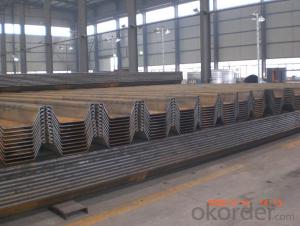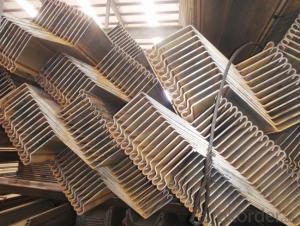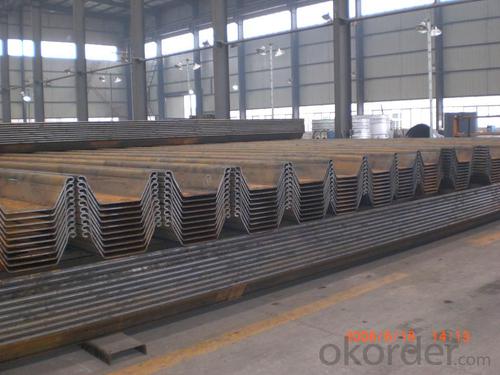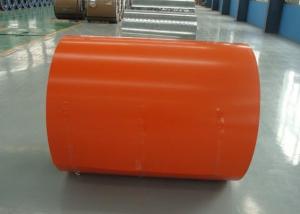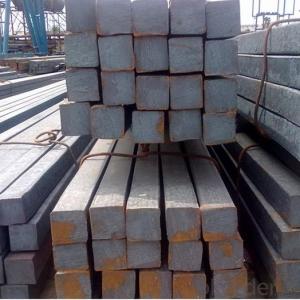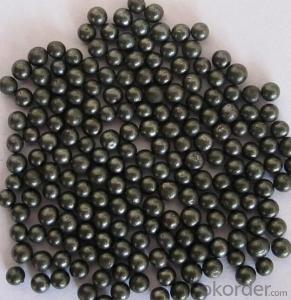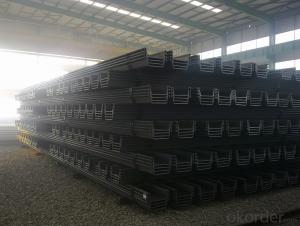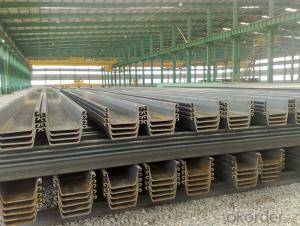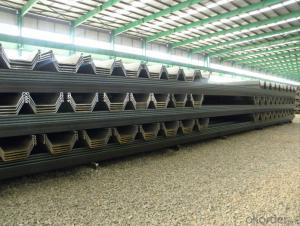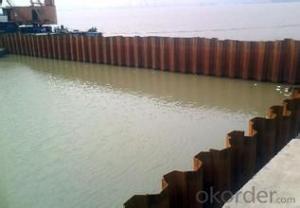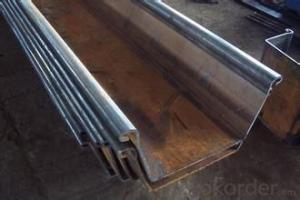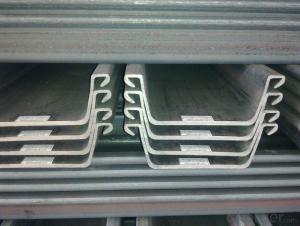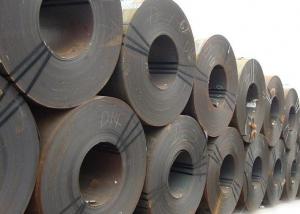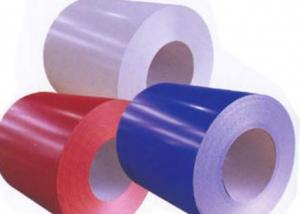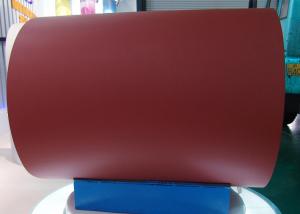Straight Web Steel Sheet Pile
- Loading Port:
- China Main Port
- Payment Terms:
- TT OR LC
- Min Order Qty:
- -
- Supply Capability:
- -
OKorder Service Pledge
OKorder Financial Service
You Might Also Like
Specifications of Straight Web Steel Sheet Pile:

Profile | Width B mm | Height H mm | Thickness T mm | Section area A cm2/m
| Mass G | Moment of Inertia cm4/m | Section Modulus cm3/m | |
Per pile kg/m
| Per wall kg/m2
| |||||||
WRX 600-10 | 600 | 60 | 10.0 | 144.8 | 68.2 | 113.6 | 396 | 132 |
WRX 600-11 | 600 | 61 | 11.0 | 158.5 | 74.7 | 124.4 | 435 | 143 |
WRX 600-12 | 600 | 62 | 12.0 | 172.1 | 81.1 | 135.1 | 474 | 153 |
Steel Grade for Sheet Pile
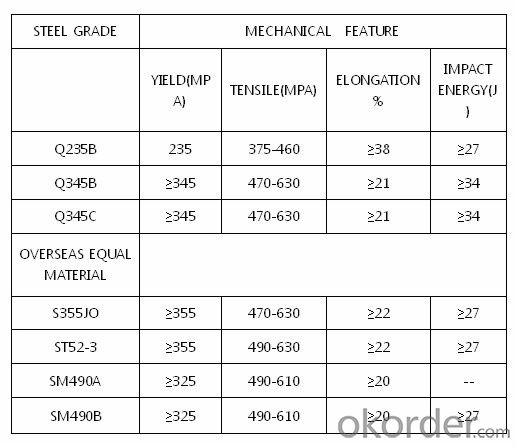
Usage and Applications of Straight Web Steel Sheet Pile:
1. Used for the permanent constructional structure such as embankment, harbors, docks, retaining walls, anti-earthquake reinforcement project, flood gates, etc
2. used for the provisional structure to seal the mountain, provisionally to retain the wall, to cut off the river, to cofferdam, to lay the pipeline and to ward off the earth, the water or the sand
3. Used for the flood-fighting and emergency rescues to prevent the flood, collapse, sink or sediment flow, etc.
- Q: What are the advantages of using steel in high-rise buildings?
- There are several advantages of using steel in high-rise buildings. Firstly, steel is a strong and durable material that can withstand high wind loads and seismic forces, making it suitable for tall structures. Secondly, steel has a high strength-to-weight ratio, allowing for lighter building components and reducing the overall weight of the structure. This, in turn, reduces foundation requirements and construction costs. Additionally, steel is a versatile material that can be easily fabricated and assembled, allowing for efficient construction and faster project completion. Finally, steel is a sustainable option as it can be recycled and reused, minimizing environmental impact and promoting sustainability in the construction industry.
- Q: How is steel rebar cut and bent for specific construction needs?
- Steel rebar is cut and bent for specific construction needs using specialized tools such as rebar cutters and benders. The rebar is measured according to the required length and then cut using the cutter. To achieve the desired shape, the rebar is then bent using a mechanical or hydraulic bender. This process ensures that the steel rebar is tailored to meet the specific requirements of the construction project, allowing for precise reinforcement and structural support.
- Q: How do steel products contribute to the healthcare and medical industry?
- Steel products contribute to the healthcare and medical industry in various ways. Steel is commonly used in the manufacturing of medical instruments, surgical tools, and equipment due to its durability, strength, and resistance to corrosion. Steel is also used in the construction of medical facilities and hospitals, providing a strong and safe infrastructure. Additionally, steel is used in the production of medical storage cabinets, beds, and other furniture, ensuring a sterile and hygienic environment. Overall, steel products play a crucial role in providing reliable and high-quality healthcare services.
- Q: How is steel sheet metal coated for corrosion protection?
- Steel sheet metal is coated for corrosion protection through a process called galvanization. This involves immersing the sheet metal in a bath of molten zinc, which creates a protective layer on the surface of the steel. This zinc layer acts as a barrier, preventing oxygen and moisture from coming into direct contact with the steel and causing corrosion. Additionally, it provides sacrificial protection, meaning that if any small areas of the steel are exposed, the zinc will corrode first, sacrificing itself to protect the underlying steel. This coating method effectively extends the lifespan and durability of steel sheet metal in various applications.
- Q: What are the advantages of using steel wire?
- There are several advantages of using steel wire. Firstly, steel wire is incredibly strong and durable, making it suitable for a wide range of applications. It can withstand high tension and heavy loads without breaking or deforming easily. Secondly, steel wire has excellent corrosion resistance, particularly when it is galvanized or coated. This makes it ideal for outdoor use or in environments with high moisture or chemical exposure. Additionally, steel wire is highly flexible and can be easily manipulated into various shapes and forms, making it versatile for different purposes. Lastly, steel wire is cost-effective, as it is readily available and its production costs are relatively low compared to other materials. Overall, these advantages make steel wire a popular choice in industries such as construction, automotive, manufacturing, and agriculture.
- Q: How are steel plates heat-treated for improved strength?
- Steel plates are heat-treated for improved strength through a process called quenching and tempering. This involves heating the steel plates to a specific temperature and then rapidly cooling them in a liquid, such as oil or water, to harden the material. After quenching, the plates are then reheated to a lower temperature and held there for a certain period to reduce the internal stresses and increase toughness. This heat treatment process enhances the strength, hardness, and durability of the steel plates, making them suitable for a wide range of applications.
- Q: How is steel billet produced?
- Steel billet is produced through a process called continuous casting, where molten steel is poured into a water-cooled mold to form a solid rectangular shape. Once solidified, the billet is then further processed through reheating and rolling processes to achieve the desired size and shape for various steel products.
- Q: How is steel tubing used in the manufacturing of hydraulic cylinders?
- Steel tubing is commonly used in the manufacturing of hydraulic cylinders due to its high strength and durability. It provides a reliable and rigid structure to hold the hydraulic fluid and withstand the intense pressure and forces involved in hydraulic systems. The seamless construction of steel tubing ensures smooth fluid flow and minimizes the risk of leakage, making it an ideal choice for hydraulic cylinder applications.
- Q: What are the common uses of steel in everyday life?
- Steel is commonly used in everyday life for a variety of purposes. It is used in construction for buildings, bridges, and roads due to its strength and durability. Steel is also used in the manufacturing of vehicles, appliances, and machinery, as it provides structural support and can withstand heavy loads. Additionally, steel is used in the production of household items such as utensils, tools, and furniture. Overall, steel plays a crucial role in our daily lives, contributing to the infrastructure and functionality of modern society.
- Q: What are the different grades of steel and their applications?
- There are several grades of steel, each with its own unique properties and applications. Some common grades include mild steel, which is a versatile and widely used grade for general construction and fabrication purposes; stainless steel, known for its corrosion resistance and used in kitchen appliances, medical equipment, and chemical processing; high carbon steel, used for making cutting tools and machinery parts that require high strength; and alloy steel, which contains various elements to enhance its strength, durability, and heat resistance, commonly used in automotive and aerospace industries. These are just a few examples, and there are many more grades of steel available, each tailored for specific applications based on their composition and properties.
Send your message to us
Straight Web Steel Sheet Pile
- Loading Port:
- China Main Port
- Payment Terms:
- TT OR LC
- Min Order Qty:
- -
- Supply Capability:
- -
OKorder Service Pledge
OKorder Financial Service
Similar products
Hot products
Hot Searches
Related keywords
